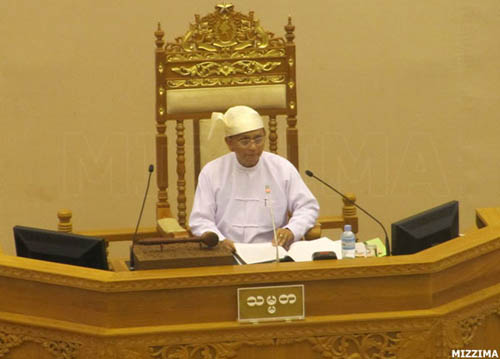Chiang Mai (Mizzima) – The ripple effect of the slowing world economy has created “crises” in Burma’s economy, President Thein Sein told a joint session of Parliament on Monday.
Speaking at the opening of the second regular Union Parliament, he said, “Due to external factors of instability in the international monetary system and the stagnation of the world economy, the Burmese economy suffered a ripple effect. Because of these related effects, our domestic economy encountered some crises too.”
 Adding to the country’s economic woes was unusually heavy rainfall that damaged paddy fields and destroyed rice and other agricultural crops.
Adding to the country’s economic woes was unusually heavy rainfall that damaged paddy fields and destroyed rice and other agricultural crops.
“The government is working in association with private sectors trying to reduce the production costs in farming for our farmers,” he also said.
Thein Sein told industrialists and traders on August 16 that the government will buy 1 million tons of rice as reserve rice for the country , according to the Myanmar Times. The rice will be bought from Irrawaddy, Sagaing and Pegu regions, and the government will build storage shelters to stockpile the rice.
The US dollar price fell to a record low of 680 kyat on Tuesday in the Burmese foreign exchange market. The falling dollar price has impacted exporters, the travel and tour industry and workers who earn their wages in US dollars and send “remittances” into the country.
Regarding the ongoing civil war in ethnic areas and other ethnic issues, he said: “We are expressing our sincere beliefs to the armed ethnic groups which do not yet accept the State Constitution, and we are opening our door of peace to them for the benefit of the entire people.”
Thein Sein, a former general and prime minister under the military government, also said that strict action would be taken against corruption and people contributing to a “red tape” system of bureaucracy.
In the economic area, he said that the state had a target to reduce poverty to below 16 per cent by 2015. He said Burma was working to assume the chairmanship of Asean in 2014.
In his opening session address, Shwe Mahn, the Lower House speaker, said that the government would take into consideration the criticism made by both domestic and foreign media, and that journalists would be granted access to cover Parliament news. During the first parliamentary session, journalists were not allowed to observe Parliament in session.
Speaker Shwe Mahn moved a motion to form 19 Lower House committees including democracy and fundamental rights of citizens, human rights, ethnic unity and peace, farmers’ affairs, international affairs, economic and trade, transport communication and construction, culture and public relations, agriculture and livestock, investment and industry development.
Finance and Revenue Minister Hla Tun moved a motion to amend the Profit Tax Law, Stamp Duty Law, Court Fees Act, and various trade tax and income tax laws.
A total of 211 MPs attended the Upper House session and 389 MPs attended the Lower House session on Monday.
On Tuesday, the lower and upper houses will convene separately and a joint session of Parliament will convene again on Friday, MPs told Mizzima.


